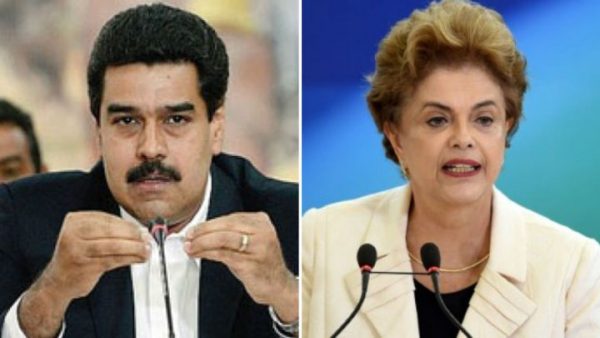 The left-wing governments of Brazil and Venezuela are reeling from economic woes, with emboldened opposition groups pushing for presidents Dilma Rousseff and Nicolas Maduro to step aside. But analysts say Venezuela is on a very different path.
The left-wing governments of Brazil and Venezuela are reeling from economic woes, with emboldened opposition groups pushing for presidents Dilma Rousseff and Nicolas Maduro to step aside. But analysts say Venezuela is on a very different path.
A final decision on Brazil’s President Rousseff’s impeachment still lies months away, with the country’s first woman president promising to mount an aggressive defence. But after the country’s senators overwhelmingly voted in favour of launching an impeachment trial on May 12, thus temporarily suspending her from office, there is a strong possibility Rousseff will be forced out permanently.
Like Rousseff, Maduro is struggling with hyperinflation and depressed oil prices, with the added burden of food and energy shortages across Venezuela. Like his Brazilian counterpart, he is facing increasingly loud calls for his ouster.
On Monday he gave himself wide powers over security, food distribution and energy supplies under a decree that has established a state of emergency for at least 60 days and angered political opponents.
#Venezuela: Protests against President Maduro have been ongoing. Last week, national guard was called in. (Getty) pic.twitter.com/D0UvZaElRh
— reported.ly (@reportedly) May 16, 2016
Venezuela’s opposition claimed control of the National Assembly in January of this year, and is now seeking to organize a recall referendum. It says it has collected 1.8 million signatures to launch the process.
Separation of powers?
Carlos Malamud, a senior researcher at the Elcano Royal Institute in Madrid, noted that Brazil’s impeachment process and Venezuela’s recall referendum where both enshrined in their respective constitutions. The first is a parliamentary mechanism while the second confers power on ordinary voters to remove the president.
“Brazil counts a strong and independent judicial branch, which has allowed the impeachment process to go as far as it has,” Malamud said, adding that Venezuela was a very different story. “In Venezuela, the supreme court is subordinate to the executive, so any effort to implement change by the National Assembly will be limited.”
Human Rights Watch this week highlighted the lack of judicial independence in Venezuela, calling on the Organization of American States (OAS) to address the situation. But even if the OAS decided to take such an appeal seriously, it would do little to sway Caracas.
“A recall referendum is very doubtful, almost impossible,” Malamud said, pointing out the Venezuelan Vice President Aristobulo Isturiz ruled out the possibility of a referendum on Monday, calling the process a fraud.
Also on Monday, Jorge Rodriguez, the head of the commission supervising the referendum bid and a Maduro appointee, said thousands of the signatures were from deceased Venezuelans.
Looming deadline
Anna Ayuso, senior research fellow at the Barcelona Centre for International Affairs, agreed that a referendum to boot out Maduro was unlikely.
“I don’t think the two situations are similar,” Ayuso said when asked to compare the political crises that have struck Venezuela and Brazil.
“It has been a long time since the Venezuelan opposition has been playing the referendum card. Rousseff’s impeachment only became possible when the (former coalition partners) PSDB turned on her. In Venezuela the entire opposition has been on the same page,” she said.
Ayuso pointed out that the recall referendum is also facing a deadline that is unlikely to be met. The popular vote must be held by the end of the year to trigger new elections, and with the support of the Supreme Court, Maduro can stall.
If the referendum is held in 2017 and Maduro is voted out, VP Isturiz, a die-hard supporter, would simply serve out the rest of his term.
Buying time
#Venezuela: Protests against President Maduro have been ongoing. Last week, national guard was called in. (Getty) pic.twitter.com/D0UvZaElRh
— reported.ly (@reportedly) May 16, 2016
Venezuela’s opposition has called for mass protests on Wednesday against the state of emergency and efforts to delay their recall referendum, prompting fears of a return of bloody unrest.
Violent clashes between protesters and police during four months in 2014 killed 43 people. Ayuso said the danger of new flare-ups was real, even if the opposition was trying to avoid such a scenario.
“In view of what happened in 2014 the opposition has refrained from calling for violent protests, but there is a risk of violence regardless, especially in Caracas, which is one of the most violent cities in the world,” the researcher noted.
She said Venezuela’s military is playing a key role in safeguarding order during a volatile time, and what stance it takes if a new wave of protests erupts will be critical in determining Maduro’s future.
So far the military has said it wants to avoid confrontations with civilians.
Likely to slog through recession until at least the end of 2017, Venezuela’s embattled president appears to be facing a deficit of political options as well.
“He knows that if there were elections today he would lose, so the best he can do is buy time and hope to reclaim control of the country,” Ayuso said.
FRANCE24

Leave a Reply
You must be logged in to post a comment.